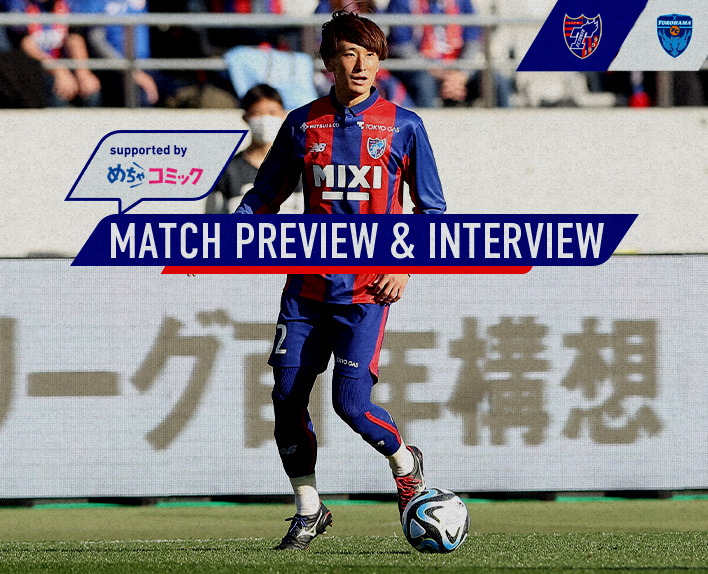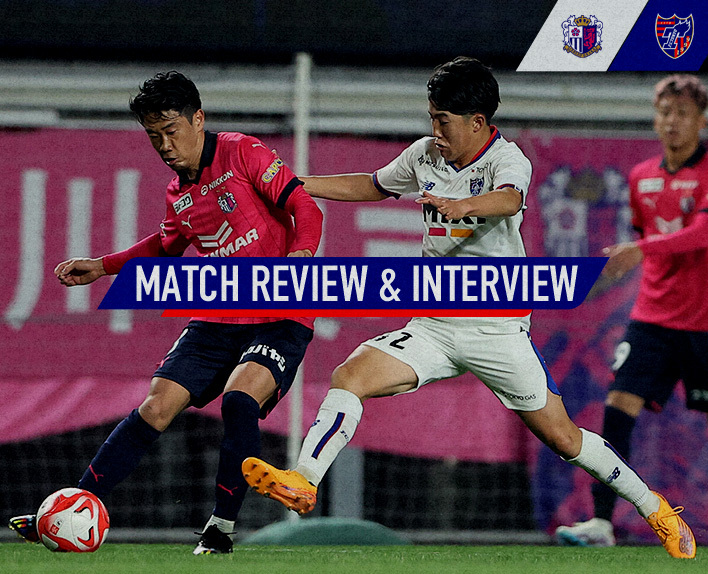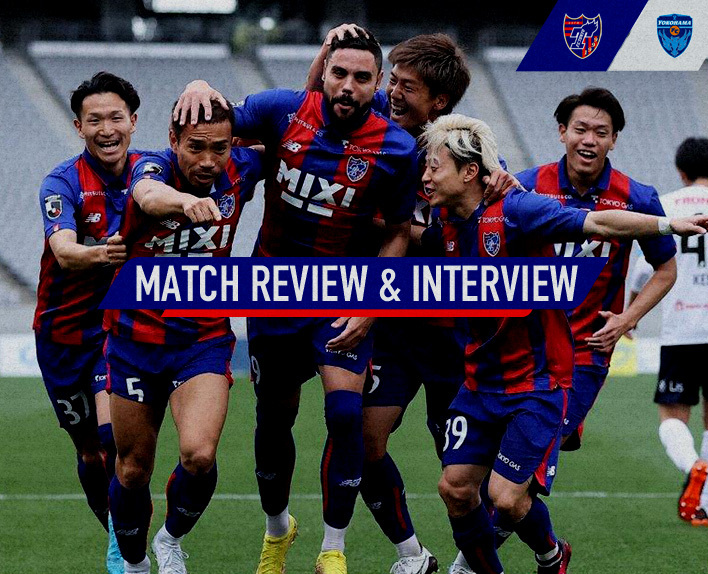<Review of the previous match against Kyoto>
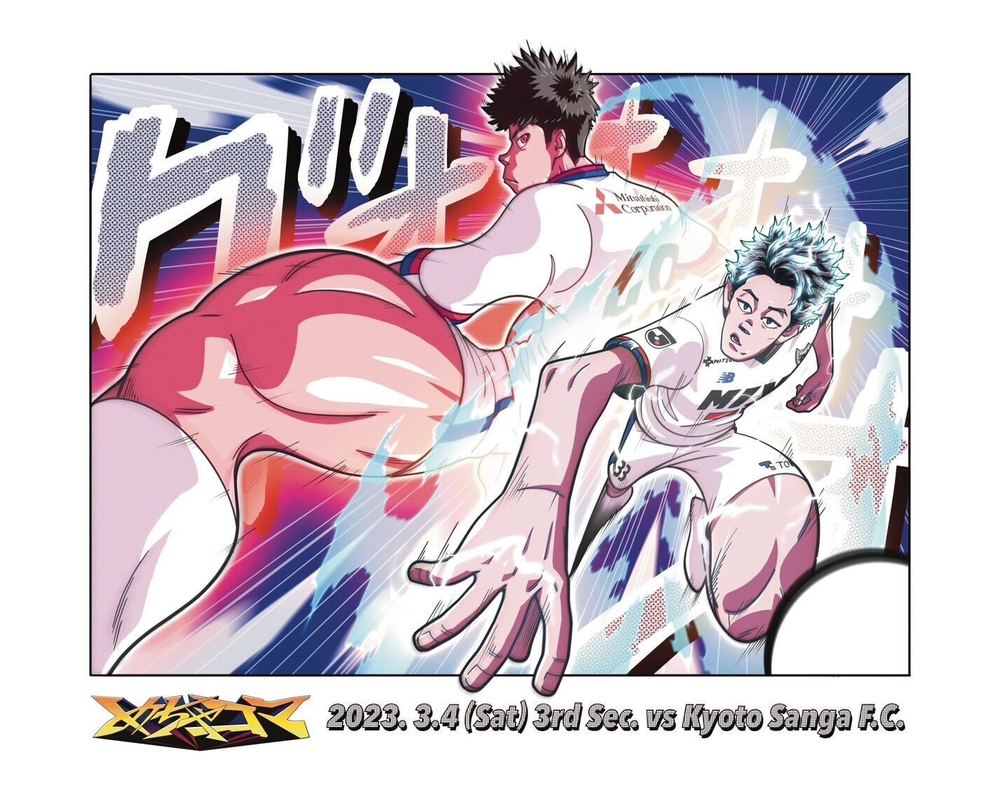
Even in the midst of a tough situation, there were moments when a bright light shone on Tokyo's future.
In the second match of the away back-to-back games, the clash against Kyoto SANGA F.C. forced a tough battle from the beginning. Just 5 minutes into the first half, the goal net was shaken, but we escaped trouble due to a foul call. We managed to withstand the opponent's momentum with a big save from Jakub SLOWIK, ending the first half under pressure.
As the second half begins, the game becomes somewhat open with both sides increasing their counterattacks. In this context, compared to Kyoto, which steadily connected plays to finish, Tokyo struggled to create effective chances. After showing a fierce attack in the second half against Kashiwa Reysol in the previous match, they found it difficult to break through the opponent's defensive block.
The players who revitalized the team were Kota TAWARATSUMIDA, who was brought on in the 12th minute of the second half, and Yuta ARAI, who was brought on in the 33rd minute of the second half.
Tawaramizuki player utilized his breakthrough ability to penetrate deep into the opponent's territory, creating a scene where he supplied the last pass in front of the goal. Arai player also took some time to get into the rhythm due to the intensity at the ball, but towards the end, he connected a sharp ball into the goal area with a cross from a cut-in, leading to a chance.
It was a tough match where we couldn't break through to score, allowing an additional goal in stoppage time. The frustration of not earning points weighs heavily on our hearts, but the young determination to revive the team and turn the game around from behind was the only remaining glimmer of hope for the future.
The rookies standing on both wings will bring joy to Tokyo. That day should not be far off.
<Preview>
The league opening match was a victory against Urawa Reds with a score of 2-0, but since then, there have been no wins in the last three official matches. There are still challenges remaining for Coach Albert PUIG ORTONEDA to achieve one of this season's goals of "consistent performance."
On the other hand, during that time, many players, including Ryunosuke SATO, who is registered as a second team player with FC Tokyo U-18, made their first appearances of the season and took their first steps.
Immediately after losing to Kyoto SANGA F.C. in the previous match, Tsubasa TERAYAMA struck the pitch with his fist. He expressed his feelings at that moment by saying, "Even though the fans and supporters were cheering loudly during the match, I felt a sense of regret."
In the subsequent Levain Cup match against Cerezo Osaka, Leon NOZAWA covered his face with his uniform after losing 0-1. After the match, he expressed his frustration, saying, "I had been building up through individual practice after training. Therefore, it's disappointing and frustrating that it didn't lead to a result."
Tokyo, which is showing a new face with the rise of young players, will welcome Yokohama FC at home this matchday. The playmaker for Yokohama FC is Hirotaka MITA, who grew up in Tokyo's academy and loves the blue and red more than anyone. Facing an opponent who knows the heat of Ajinomoto and the strength of Tokyo, we cannot afford to fight poorly. To ride the upward momentum from here, only victory is required.
The match day program is here
[Interview with Coach Albert PUIG ORTONEDA]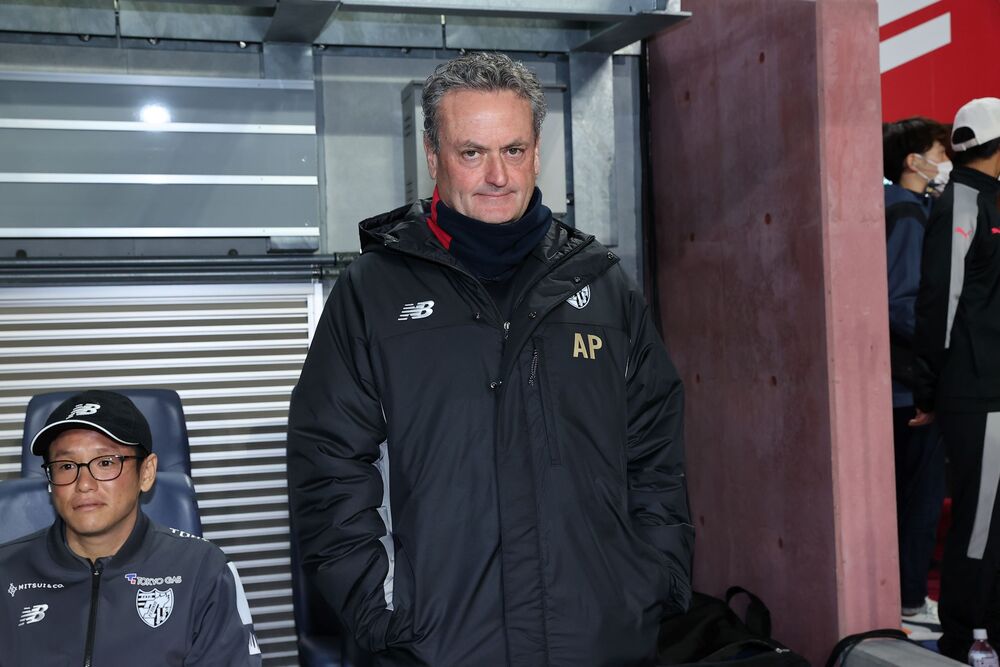
Q: We lost to Cerezo Osaka in the Levain Cup, but I think the performance was good. How do you want to carry that into tomorrow's match against Yokohama FC?
A positive point from the match against Cerezo is that we created about 8 decisive chances. Although our ball possession rate was significantly lower, the areas where the opponent had possession were not dangerous zones. In that sense, I am not concerned about the ball possession rate. As for areas of improvement, while we were able to create chances, we needed to maintain possession a bit more and take control of the match ourselves.
In Niigata, we were focused on maintaining possession of the ball. Now, I think what we are working on in Tokyo is more challenging. It is indeed difficult to maintain the balance between keeping possession of the ball and moving forward quickly. However, I have no doubt that we are moving in a good direction, and I am not worried. The fact that young players performed well in the Levain Cup is also good news for us. Based on their performance, they have proven that they are deserving of opportunities in the league.
It is a positive point for us that there were several players, such as Shuhei TOKUMOTO, Taishi Brandon NOZAWA, and Seiji KIMURA, who had not had many opportunities to play but performed well. That is why I felt a certain anger at losing the match. On the other hand, I also felt satisfied. It was a match where I could feel that the future of Tokyo is bright.
Q, by expanding the options for bench members, the range of tactical changes in the second half has increased, which must have been a positive factor for the coach as well.
A, this leads to good acceleration not only from the second half but also from the start. The rule allowing five substitutions has a significant impact. I believe there will be dramatic changes in the match during the long final 30 minutes. It is still fresh in our memory that Ryoma WATANABE, Shuto ABE, and Koki TSUKAGAWA, who came on as substitutes in the second half, dramatically changed the flow of the game. It is very unfortunate that WATANABE, ABE, and Kuryu MATSUKI are absent, but the players showed good performances in the Levain Cup. Of course, having more options for bench members is a plus, and the increased level of competition for positions within the team is good news. I believe young players like Kota TAWARATSUKIDA, Tsubasa TERAYAMA, and Yuta ARAI have proven they are capable of performing well in the league matches. Both MATSUKI and KUMADA are still 19 and 18 years old, and we look forward to their success as well. Tokyo has many young players on the roster. We hope to continue fostering their growth and that they will become players who will carry Tokyo’s future.
Q: How do you want player Tawaramizuki to use his clear weapon, dribbling?
A. I think players Tawara Tsukida and Arai have been able to firmly perform the play we have expected from them since the first day.For players who challenge one-on-one situations on the front line, especially on the sides, I tell them to play boldly and keep going even if they fail. I have told them from day one that if they don't do that, no play opportunities will come their way. I don't choose to use young players simply because I like them. However, for young players who have a hungry spirit and can express it properly, I want to help their growth. That is why I demand a hungry spirit from young players. I only ask them to have a hungry spirit and to play boldly with courage. I think the two are doing that well, and including player Terayama, things are moving in a good direction. They make me want to encourage their growth. If young players truly want to grow and succeed, I am ready to support them. For players in their mid to late 20s, who are a bit older, I demand high performance. For foreign players, I expect them to show difference-making play.
Q: What are you looking for in terms of tactics?
A. Learning defensive tactics is easy. Player Tawaramizuki has a great weapon. He is simply told to make the most of one-on-one situations. If there is no defensive support in a clear one-on-one situation, then he should take the initiative. If he doesn't challenge when the covering is late, then we don't need such a player. He should take the initiative in one-on-one situations, and if he loses the ball, the coach will obviously be yelling from the bench. He has to endure that. But he must keep going. Even if I, as the coach, am angry, he should ignore that and continue to play. I expect him to do that, and I believe he is doing it.
[Player Interview]
<Hotaka NAKAMURA>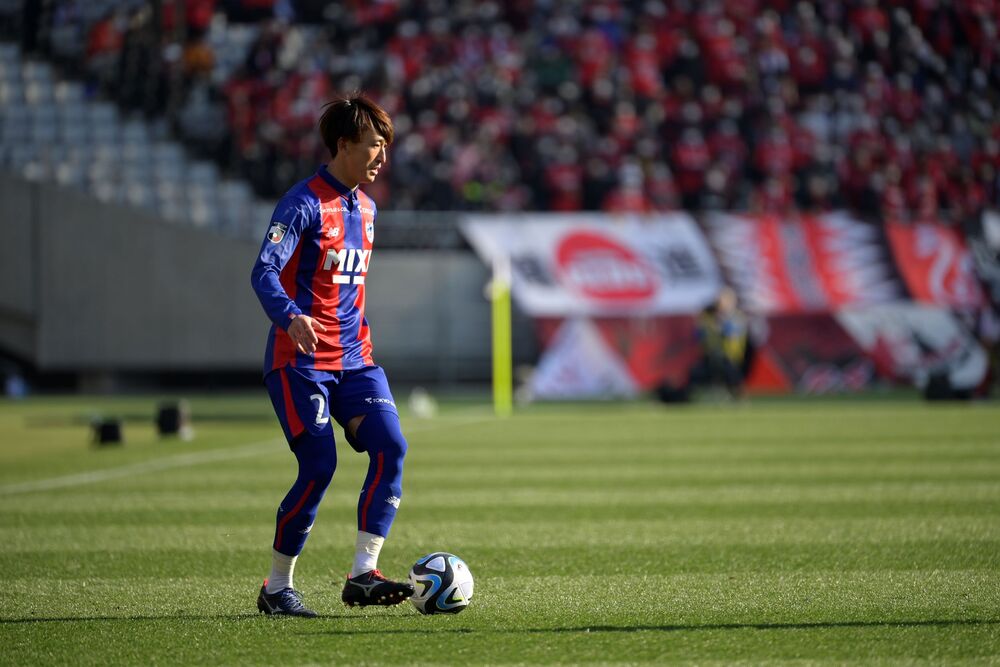
Q, please review the Levain Cup match against Cerezo Osaka.
A, there is absolutely no change in motivation depending on the tournament. We did not think about the league matches and focused solely on giving our all in the FC Osaka match. In the Levain Cup, the lineup changed significantly, so there was hardly any time to unify our intentions or confirm tactics. I thought it would be a difficult match, but player Higashi took the lead, and I believe we were able to stay focused on fighting first and foremost. Especially in the first half, although there were times when we were under attack, everyone defended firmly, and I think we were able to create a good flow for ourselves. Regarding the conceded goal, there are aspects I need to reflect on myself. Even if we managed to get shots on goal, if we don't score that one goal in the first half, the match unfolds like that. FC Osaka surely took that one goal. It reminded me once again that football is about scoring goals. Personally and as a team, I felt we need to pursue this further.
Q: You wore the captain's armband, what were you conscious of?
A, being the captain was the first time in my life, including official matches. I thought it would be impossible to play and speak like a typical captain, so I focused on playing as usual. In the second half, there were many times when we were under pressure, and there were moments when the team had to endure, and everyone was showing signs of fatigue, causing our formation to stretch. By wearing the captain's armband, I realized the importance of making slight adjustments during tough times with just a word from the captain and leading the team. The presence of players like Morishige, Diego TABA, and Azuma felt truly reassuring. I believe there were many struggles, but they are still leading Tokyo, and I felt their greatness once again.
Q: There are players who have transferred from Tokyo to Yokohama FC, but what are your thoughts on this?
I think it is a huge threat to have two players like Hirotaka MITA and Takumi NAKAMURA, who know us well. They are actually key players for Yokohama FC, so it makes things difficult. Right now, we are on a two-game losing streak in official matches. It is a tough situation with some injuries, but I don't want to use that as an excuse, and I want the players on the pitch to show a strong fighting spirit at times like this.
Q, what do you think about the presence of Takumi NAKAMURA?
As a teammate who competed for the position, I truly respect him. I believe his playing style is the opposite of mine, and I studied and learned from watching him practice every day. I think Nakamura also observed my strengths, and we both had weapons that the other did not possess. Every day was incredibly stimulating, and I practiced with the feeling that I did not want to lose in the position battle. Since he is a player I see as an opponent, I have an even stronger desire not to lose. First of all, I want to do my best so that the team can win.
Q: I think it's a place to show how much we've both grown during the time apart.
A, I don't really think about it much. I know that Takumi NAKAMURA is a skilled player. Having gone through the J2 League and returning to the J1 League, I wouldn't be too surprised even if he has changed. I know he is an amazing player to that extent. Therefore, there are parts of me that can only be satisfied by winning. However, I want to play without thinking too much about that.
Q: This season, I think every match has been played with considerable intensity. What do you think?
A, this year, I absolutely do not want to run away from anything. I definitely do not want to lose to the opponent in front of me. I do not want to run away from my own weaknesses, and I want to fight with determination. However, as a result, I was sent off in the match against Kashiwa. I was encouraged by players like Nagatomo and Morishige, who said that it is important to always coexist passion and calmness. I truly felt this firsthand, and it was a great learning experience. I caused a lot of trouble for the team, but I believe I must not waste this experience. I think I have grown further by being able to turn that experience into something for the second match. However, I absolutely do not want to change my passionate play, and I definitely do not want to change my fighting spirit. I want to keep my head cool while keeping my heart burning and do my best.
Q: What motivated you to play with passion this season?
A. Until now, even though I thought I was playing with confidence, I often lacked confidence and showed my weaker side at crucial moments. With that mentality, I could never reach the top; I was constantly told by Nagatomo that I lacked the intensity. This season, I want to shed all my self-doubt and negative thoughts and express my feelings fully. Nagatomo will also be playing this season, but I have no intention of giving up my starting position in any match. I truly believe that I need to have that level of determination.
Q, that feeling is also reflected in wearing the number 2 jersey.
A, the number 2 jersey has been worn by amazing predecessors throughout history, and it carries a lot of weight. There is pressure associated with it. Until now, I wore number 37 because I didn't want to bear that pressure. However, I realized that this mentality wouldn't work, and I need to become a strong player who can bounce back; otherwise, I won't reach the stage I ultimately want to achieve. Therefore, I made the decision to wear number "2" with determination. I believe that is reflected in my current mindset.
Q: When did you hear about the "glaring feeling" from player Nagatomo?
A, it has been said since last season. Nagatomo has been playing as a right back all along, and I was using that as an excuse to run away, thinking I couldn't do it anymore. He saw right through me. When it was uncertain whether Nagatomo would retire after the World Cup, I was wondering what I would do if he retired like this. It was a time of uncertainty, but once it was decided that I would continue, I felt I had to step up to the point where Nagatomo would say, "I've left it to you." When I decided to play in Tokyo this season, I signed with that determination. Recently, I was told, "You've finally started to get fired up." I am truly grateful. I want to show even more intensity.
<Keigo HIGASHI>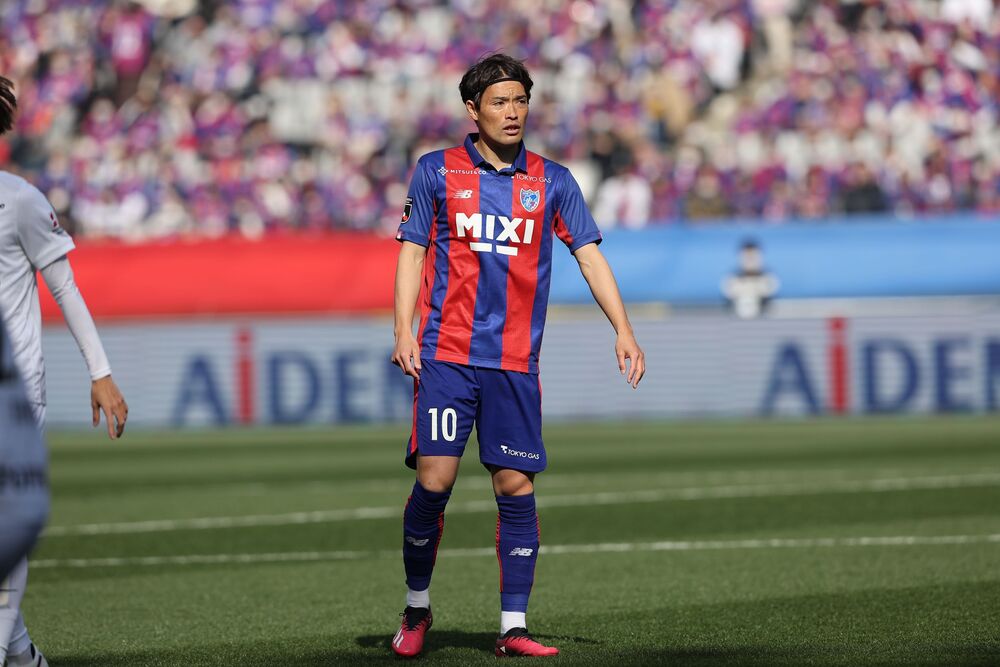
Congratulations on your 350th appearance in the J1 League.
A, thank you.
Q: Please share your thoughts after the first four matches of this season.
We started with a victory against Urawa in the opening match, a draw against Kashiwa, and a loss away to Kyoto, so it's not a great start. I think it's important to closely examine the issues, improve, and aim higher. Right now, we have some injured players, and Matsuki is away with the national team, so it feels a bit chaotic. I hope we can all overcome this together.
Q: In the second season under Coach Albert PUIG ORTONEDA, player Higashi continues to play in the anchor position. Has there been any change in your mindset in the second season?
A, we must continue what we built up last season this season. It's not just about the style of football we aim for, but also about the commitment to competition, the quality at the end, and the critical moments where we need to focus. I believe we all need to delve into this. Along with the team's improvement, I want to clear each of these aspects one by one.
Q: I think the opposing team has realized that Tokyo is connecting the ball and is applying stronger pressure in defense. Have you noticed any changes from the opponent?
A, the opponent will also play their own style of football. I think we will continue to face teams that come at us aggressively from the front and apply high pressure. There is certainly a compatibility factor, but we must do what we can do. Not only the style, but the final details are important in every match. After three matches, I realized once again that this will be the key.
Q: What is your attitude towards practice?
A, personally, I really enjoy regular practice and matches. I can approach it with that feeling, and I want to continue doing it throughout the season. I believe that if this leads to victories, it will make the enjoyable aspects even broader, and I want to make it a season like that.
Q: I would like to ask about achieving a total of 350 appearances in the J1 League. First, please share your honest thoughts.
A, I don't feel it much, but looking back, I still remember my first appearance. My debut was in an away match against Urawa at Saitama Stadium during my time with Oita Trinita. I think 350 matches have passed in the blink of an eye since then. There have been many stories beyond the matches that have brought me this far. I want to thank everyone involved. I have come to realize the importance of my family, and I truly want to express my gratitude to the fans, supporters, players, and coaches. I couldn't have come this far alone, and I want to continue to play more matches with the support of those people.
Q: Among the 350 matches, is there a particular match that stands out to you?
I think this is definitely my first match. Even if someone asks me if I remember my 75th match, I certainly do not. There are milestones like 100 matches and 200 matches, but the first match I played as a professional is very memorable. If I had forgotten the feelings from that time, I wouldn't be here now. I believe that matches 300 and 350 will serve as milestones to remind me of those feelings from back then. When I think about reaching 350 matches, I believe it's good to recall the time of my first match.
Q: What match stands out to you in Tokyo?
A, there are so many that it's difficult. Of course, I'm happy about the matches we won, and the matches we lost also leave a strong impression.
Q: The J1 League only has 34 matches in a season, so even playing full-time for 10 years won't reach 350 matches. Considering that, I think it's an incredible record. Is there a reason or secret for being able to consistently play in matches up to this point?
A, I don't think there are any secrets. I have prepared and taken care of myself for each match. I believe it would have been impossible for me to play 350 matches in the J1 League by my own strength, and although it feels strange to say this about myself, I think it's an amazing record. There is no doubt that I have come this far with the support of many people, and I truly feel that. As long as my body can move and my heart holds up, I want to keep going as a football player.
Q: Recently, I think the young players in Tokyo have been standing out. From your experience of playing in 350 matches, if there is anything you would like young players to pay attention to, please share.
I would be happy if you could feel something by seeing how I always act in the clubhouse, rather than just through words. I want you to see and feel that. I'm not doing anything special, but I believe that doing the ordinary things every day has led to where I am now. If even one or two people can feel something from what I am doing and connect it to the future, I would be happy.
Q: This season, vocal support has been allowed in all seats. The opening match saw about 40,000 fans and supporters, and for the first time in a while, Ajinomoto Stadium was filled with a great atmosphere. Do you feel like it's back to the way it was before the pandemic in the 2019 season?
A, from the opening match, we created a really great atmosphere, and many fans and supporters came to cheer us on even away from home. I felt once again that it gives us power. Since it had become normal not to have cheers, I thought the vocal support would feel refreshing. After all, I believe that playing soccer and sports in such an atmosphere is the best. I think good plays are brought out by cheers, and I want to bring out even more. I want to play with all my strength for those who support us.

